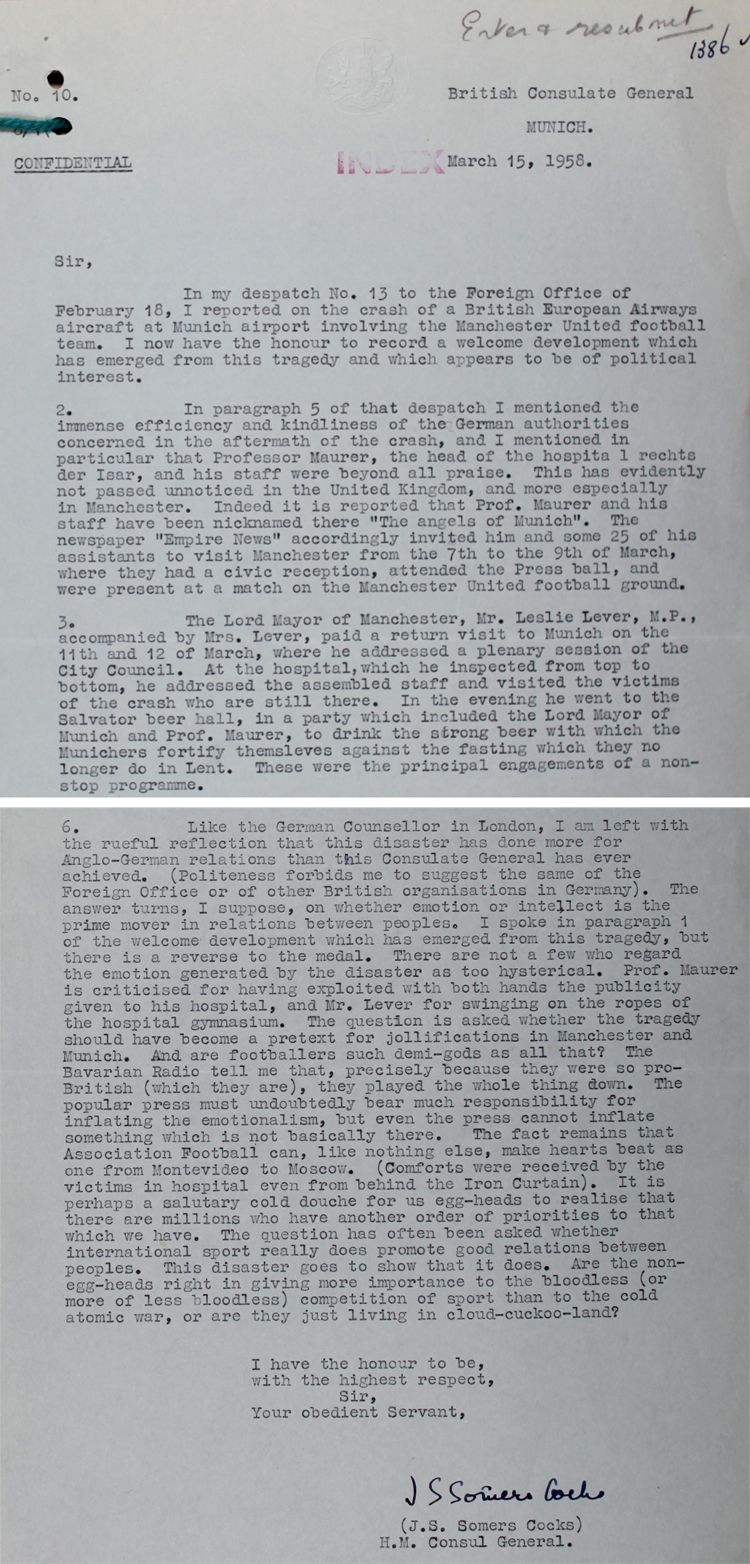
Extracts from a dispatch to the Foreign Office from the British Consulate in Munich, 15th March 1958 (FO 1042/39)
Transcript
British Consulate General
MUNICH
CONFIDENTIAL
March 15th, 1958
Sir,
In my despatch No.13 to the Foreign Office of February 18, I reported on the crash of a British European Airways aircraft at Munich airport involving the Manchester United football team. I now have the honour to record a welcome development which has emerged from this tragedy and which appears to be of political interest.
2. In paragraph 5 of that despatch I mentioned the immense efficiency and kindliness of the German authorities concerned in the aftermath of the crash, and I mentioned in particular that Professor Maurer, the head of the hospital rechts der Isar, and his staff were beyond all praise. This has evidently not passed unnoticed in the United Kingdom, and more especially in Manchester. Indeed it is reported that Prof. Maurer and his staff have been nicknamed there “The angels of Munich”. The newspaper “Empire News” accordingly invited him and some 25 of his assistants to visit Manchester from the 7th to the 9th of March, where they had a civic reception, attended the Press ball, and were present at a match on the Manchester United football ground.
3. The Lord Mayor of Manchester, Mr. Leslie Lever, M.P., accompanied by Mrs Lever, paid a return visit to Munich on the 11th and 12 of March, where he addressed a plenary session of the City Council. At the hospital, which he inspected from top to bottom, he addressed the assembled staff and visited the victims of the crash who are still there. In the evening he went to the Salvador beer hall, in a party which included the Lord Mayor of Munich and Prof. Maurer [head of the hospital], to drink strong beer with which the Munichers fortify themselves against the fasting which they no longer do in Lent. These were the principal engagements of a non-stop programme.
…
6. Like the German Counsellor in London, I am left with the rueful reflection that the disaster has done more for Anglo-German relations than this Consulate General has ever achieved. (Politeness forbids me to suggest the same of the Foreign Office or of other British organisations in Germany). The answer turns, I suppose, on whether emotion or intellect is the prime mover in relations between peoples. I spoke in paragraph 1 of the welcome development which has emerged from this tragedy, but there is a reverse to the medal. There are not a few who regard the emotion generated by the disaster as too hysterical. Prof. Maurer is criticised for having exploited with both hands the publicity given to his hospital, and Mr. Lever for swinging on the ropes of the hospital gymnasium. The question is asked whether the tragedy should have become the pretext for jollifications in Manchester and Munich. And are footballers such demi-gods as all this? The Bavarian Radio tell me that, precisely because they were so pro-British (which they are), they played the whole thing down. The popular press must undoubtedly bear much responsibility for inflating the emotionalism, but even the press cannot inflate something which is not basically there.
The fact remains that Association Football can, like nothing else, make hearts beat as one from Montevideo to Moscow. (Comforts were received by the victims in hospital from behind the Iron Curtain). It is perhaps a salutary cold douche for us egg-heads to realise that there are millions who have another order of priorities to that which we have. The question has often been asked whether international sport really does promote good relations between peoples. This disaster goes to show that it does. Are the non-egg heads right in giving more importance to the bloodless (or more or less bloodless) competition of sport than to the cold atomic war, or are they just living in cloud-cuckoo-land?
I have the honour to be, with the highest respect, Sir,
Your obedient servant,
(J.S. Somers Cocks)
H.M. Consul General
